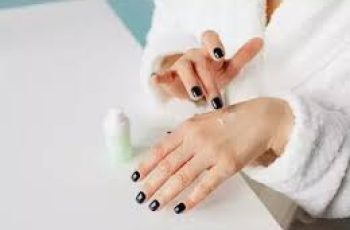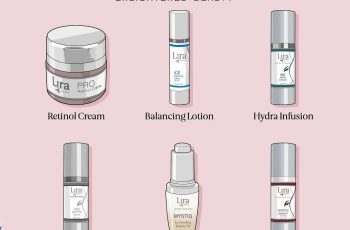
Seven years after Nicola Kilner and the late Brandon Truaxe founded The Ordinary, the company has yet to relinquish its position as one of the world’s most popular beauty brands.
If you don’t include at least one of these products in your morning and nighttime skincare routine, you’ve probably seen TikTok influencers touting products like glycolic acid toner.
(Some even use it as a deodorant, anti-dandruff and solution for cracked heels).
Not to mention the recent hype surrounding hair growth serums and the hype that a combo of Hexapeptide Solution 10% (£8.40) and Matrixyl 10% + HA (£9.00) created when people discovered that it works like Botox in a bottle.
In other words, the team at The Ordinary always know what’s hot (and what’s not) in beauty.
We caught up with Nicola, who revealed the new season’s skin and hair care trends – and as you might have guessed, they’re all affordable and revolutionary.
If you like retinol, try Matrixyl: Nicola calls Matrixyl the unsung hero of the beauty world if you want smooth, rejuvenated skin.
A small study compared it to retinol and found it had similar results in reducing fine lines, which is why it’s often touted as a cruelty-free alternative.
Retinol can cause skin irritation, such as peeling and redness, if used too frequently or incorrectly.
If you’re more cautious (especially before the sunnier months, when your skin is more exposed to the sun), you should try Matrixyl.
It’s a protein that focuses on the appearance of fine lines and repairing the skin, Nicola says.
Using Matrixyl under a moisturiser can create a plump, fresh look, which is why TikTokers around the world are obsessed with it.
The ingredient is no longer exclusive to The Ordinary as more brands move into the mainstream, although the Matrixyl 10% + HA High Strength Peptide formula (£9.00) is popular – and for good reason. Also try Medik8’s Liquid Peptides, which cost £49.
Rethinking glycolic acid: The hype around glycolic acid, the exfoliating and brightening ingredient in skincare products, continues.
The brand’s £11.50 glycolic acid tinting solution has been viewed a staggering 22 million times on TikTok.
However, Nicola noticed that people were starting to use it on other parts of their body – and most interestingly, on their hair, like TikToker An Nguyen.
She uses it as a pre-treatment for 10 minutes before washing and rinsing.
“If you have dandruff on your scalp, or even if you don’t, people use it as a scalp scrub,” Nicola says, “but the other interesting thing is that people are using it on their real hair – on their hair.”
Nicola asked Rita J. Silva, associate manager of scientific communications at Deciem, how it works.
“Rita explained that it makes the hair shinier and smoother,” Nicola says. At The Ordinary, it’s all about the science: Hair naturally has a negative charge.
This means they are attracted to the positive charge of glycolic acid. No load =
No static charge.
Nicola’s most interesting trick, however, is to use glycolic acid to treat cracked heels before sandal season arrives. According to TikTokers, this works better than applying creams and lip balm.
“I’ve tried it and it does work, but I will say that the team is not using it under the arms,” Nicola explains, referring to the trend of using glycolic acid as deodorant.
“It’s a very contained space and you can change the pH of the skin,” which can cause skin problems.
Sulfates are actually great: The clean beauty movement has demonized countless beneficial beauty ingredients, including sulfates.
However, The Ordinary is working to reintroduce them into the hair and skin care space. “We’ve always been very much against the hygiene movement,” Nicola says.
“We’ve always believed that it’s bad to sell products that have issues.
When we were looking for the best ingredients to clean our hair and body, we found a lot of incredible ingredients in sulfates,” Nicola explains.
The concentrations in many formulas are so high that brands have to add other things to these products to balance the effect.
The Ordinary’s Body and Hair Cleanser (£7.90) contains less than 4% of the ingredient – the perfect balance.
If you use a thick pan to make a casserole or stew, you need a good cleanser. Skin and hair are similar, both need good surfactants to cleanse.
The focus on sulphates gives way to spring’s biggest skin and hair trend: multi-use treatments.
“My kids are washed from head to toe,” says Nicola. “Why is this so great for babies, but as adults we need so many different products?
This spring we’ve seen a trend towards minimalism in both daily life and the products we buy.
Everyone wants something very specific, but we crave everything. “Products developed for the face can be used anywhere on the body – including the skin.” Peptides are the ultimate skin saviour. Peptides are
Peptides have been in skincare ads for a while, but don’t discount them – especially if you’re looking to remove make-up this spring.
“Peptides are a phenomenal ingredient in skincare and there are so many different types,” says Nicola.
“I still remember everything Brandon taught me and told me that a glass of milk is full of peptides. ”
Nicola explains that their effects are very broad, but they have very specific effects on the skin: they prevent skin aging and make it smoother.
“They are very powerful,” Nicola says, and can repair damaged skin over time.
Look for peptides in serums or moisturisers at Target, such as Buffet + Copper Peptides (£28.90), which contains copper tripeptides.
They boost collagen formation in the skin and have anti-inflammatory and antioxidant properties, protecting the skin from environmental impacts.
If you’re looking for a moisturiser, R29 recommends Ole Henriksen Strength Trainer Peptide Boost Moisturiser, £42. Don’t stress over your skin barrier.
Nicola describes skin barrier care as one of the biggest trends of our time.
Overdosing on ingredients such as retinol and powerful exfoliating acids can irritate the skin barrier and trigger allergies.
However, if you don’t have this problem, you don’t need special skin barrier products. “We try to stay away from trends because they’re never right in the science,” Nicola says.
“You might think you need a special product to boost your skin barrier, but when we looked at our range, many have ingredients that protect it.”
Nicola says skincare marketing is very good at this: it tricks us into buying products we don’t really need.
If you have a good and satisfying skincare routine and use high-quality products, then these should already be protecting your skin barrier. There’s no need for targeted skin barrier products.
Head care is the new skin care. “The scalp is just an extension of the face,” says Nicola, who advocates treating the follicles and scalp the same way you treat your face, morning and night.
“Once the hair leaves the follicle, it’s dead. There’s not much you can do about it other than seal it and clean it,” says Nicola.
“To really improve the strength and health of your hair, you have to start at the follicle.” That’s why using a scalp serum is so important.
“Moisturizing the skin is a fundamental need that we need to get right – including the scalp,” says Nicola.
The brand’s Natural Moisturizer + Hyaluronic Acid (£12.60) has received some great reviews from people with sensitive scalps, dry scalps and dandruff.
Another customer mentioned using it as a facial serum, which Deciem’s chief scientific officer confirmed.


